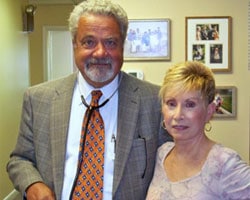Tanya, Small Lymphocytic Lymphoma Survivor
Tanya, Small Lymphocytic Lymphoma Survivor

In 1997, it all started with a lump on the back of my neck, which I dismissed as nothing more than a swollen gland. When it was still there three months later, however, I asked my primary care physician to check it out during a routine physical. He did so and said, “Well, you look pretty fit and nothing else seems out of order, so let’s wait.” In 2000, after two bouts of shingles and onset of night sweats, blood tests were ordered, which showed evidence of Epstein-Barr virus, but not much else. Since the node had increased in size, a local surgeon excised it and sent the specimen for biopsy “to put my mind at ease.” He was as shocked as I was when the results came back with the diagnosis of small lymphocytic lymphoma or SLL, a type of non-Hodgkin lymphoma.
Initially devastated, I spent several days under the covers feeling emotionally numb and paralyzed, convinced I should begin writing my obituary (mostly to be sure that there would be no grammatical or spelling errors). That was almost 12 years ago. The obituary is not yet written. I’ve been too busy.
As a nurse with decades of hospital and cancer care experience, I was well-acquainted with area oncologists. I ultimately chose one who is a close friend, with the second-opinion approval of a well-known specialist at a university medical center. Although tests showed my disease to be Stage IV, we still decided that “watchful waiting” was the best option for me. That approach worked for years, but then a series of severe infections and the appearance of an aggressive skin cancer required a new direction.
I am now cancer-free. Even though there is no way to determine how long my remission will last, I stay current regarding emerging treatment options that may help when the disease recurs. Presently, I am fully active and engaged in multiple family, social, charitable and community activities. While conscious of the perils of my diagnosis, I more fully cherish each moment of my life and every person in it. For me and my family, this disease has ended up to be a blessing in disguise. We have become even closer, and instead of “sweating the small stuff”, are learning to make the best of the hand we’re dealt. When we embrace life, most of the time it hugs us back warmly. I found that feeling sorry for myself simply leaves me less time for that embrace.